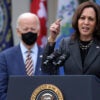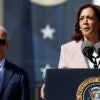After more than three years of downplaying the military option, the Obama Administration has shifted gears and become more hawkish on the Iran nuclear issue in recent weeks.
Secretary of Defense Leon Panetta, in Israel on a Middle East tour, on Wednesday called for international leaders to keep “maximum pressure” on Iran and warned that the United States “will not allow Iran to develop a nuclear weapon, period.”
The Administration’s tougher rhetoric is in part a reflection of the fact that Iran has shrugged off international sanctions, refused to negotiate an acceptable resolution of the nuclear impasse, and continues to stockpile enriched uranium at an accelerating rate.
Domestic politics may also be a factor. Panetta’s visit to Israel came shortly after Governor Mitt Romney’s visit. The Romney campaign has criticized the Obama Administration for “leading from behind” on Iran.
Although the Administration has been quick to take credit for stronger sanctions on Iran, much of the impetus for sanctions has come from Congress, which has passed sanctions legislation by huge bipartisan majorities, sometimes over the objections of the Administration.
The Administration’s sharper rhetoric is also aimed at reassuring Israel that it can depend on the U.S.to prevent Iran from attaining a nuclear weapon and therefore should hold off on launching a unilateral strike. The New York Times reported that the Administration is concerned that Israel may soon launch a preventive strike against Iran’s nuclear program.
The Obama Administration has been criticized for appearing to be more concerned with restraining Israel than with restraining Iran’s nuclear program.
Panetta’s tougher rhetoric is undoubtedly a welcome change in Israel. But Israeli Prime Minister Benjamin Netanyahu warned that time is running out for international efforts to end Iran’s nuclear defiance through diplomacy. Netanyahu said, “Things that affect our fate, our very existence, we don’t entrust to others—not even to our best friends.”
See: If Israel attacks

























